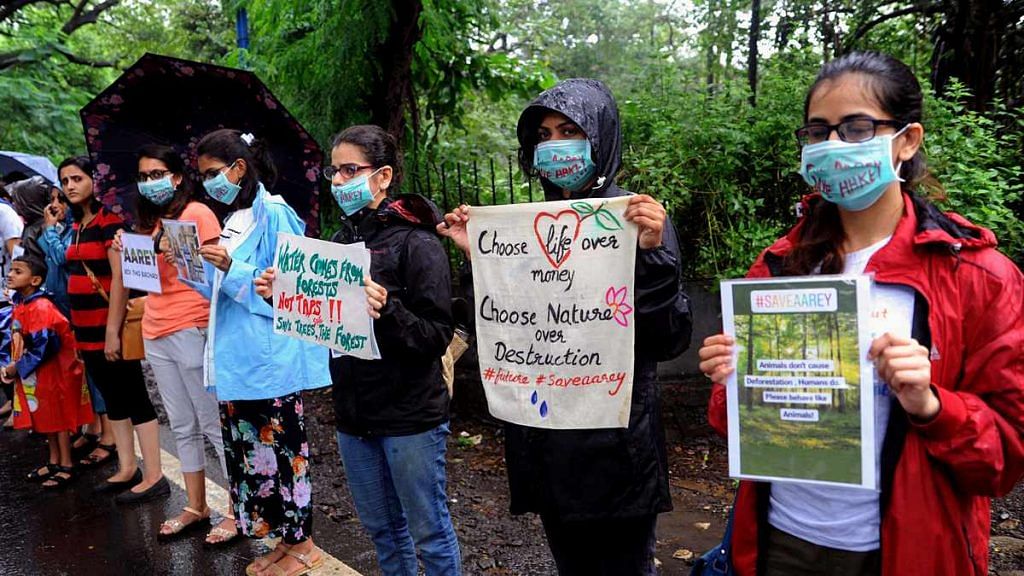I should have every reason to applaud the Supreme Court’s intervention in the Aarey forest case. I am not a hardcore environmentalist, but just sane enough to note that many of our developmental projects have hidden and incalculable costs for our future, just conscious that we cannot usurp what belongs to future generations. The proposal to build a “Red Category” – highest polluting – railway car shed for Mumbai Metro in an ecologically sensitive zone crosses my red lines.
I have more direct involvement in this struggle. My organisation and I had joined environmental activists in opposing this project. Shruti Madhvan Nair and Kapil Deep Agarwal, my colleagues from Youth for Swaraj, were among the 29 activists who were arrested while opposing the overnight drive to cut nearly 2,700 trees. Rishav Ranjan, the now-famous law student who wrote to Chief Justice of India Ranjan Gogoi to stop cutting of trees, is a dear young colleague of mine in the Swaraj family. Other activists and lawyers who led the ground and legal battle are the kind of citizens we should all be proud of.
I applaud these young activists. I wish I could applaud the Supreme Court as well.
The apex of our judiciary responding to a simple letter by an unknown young person is the kind of stuff legends are made of. A gesture like this one can build citizens’ confidence in the judiciary. One should normally bow down to the CJI who goes beyond the call of his duty. Except when you know that the same court and the same CJI has not found time for cases that are the first and foremost call of his duty.
Also read: ‘Posturing & double standard’ — why Shiv Sena is drawing flak for leading Aarey stir
Executive echo in Supreme Court
The manner in which India’s Supreme Court has dithered on the habeas corpus petitions from Kashmir Valley, is shameful, to say the least. These are not stray letters written by young unknowns. These are formal, proper petitions filed in the court whose business it is to attend to such petitions as top priority. So far, the Supreme Court has procrastinated or simply looked away. When the same Supreme Court finds time to attend to Aarey letter-cum-petition, this gesture must look like a cruel joke to our citizens in the Valley.
In a constitutional democracy, judiciary is meant to safeguard public interest against the might of the government of the day, the clout of majoritarianism, and the sway of public opinion. The Supreme Court of India is failing its constitutional duty in all these three respects.
Almost every day we find a new example of how far the power of the executive manages to find its echo inside the Supreme Court. When its judges, who enjoy constitutional immunity, recuse one after another from a sensitive case without assigning any reason, you are left wondering if the judges find the case too risky. When the central government manages to push the Supreme Court collegium into changing its decision in order to humiliate a judge, among the finest judges in the country today, you know that the judiciary’s independence is in peril. When the Supreme Court fails to protect a judge from vendetta investigations soon after her protest resignation, you know that no judge is safe.
As for majoritarianism, the strange developments in the Ayodhya case should worry any citizen of the country. The Supreme Court has before it a straight forward title suit: who is the legal owner of the piece of land where Babri Masjid once stood. But like the Allahabad High Court, the Supreme Court too has taken unusual interest in every other diversion: pre-history, mythology, sentiment and so on. Is this a precursor to an unusual judgment? We don’t know. But top leaders of the ruling Bharatiya Janata Party (BJP) have found a sudden respect for the Supreme Court’s stance in a case which they said was beyond law. Small time BJP leaders say the Supreme Court is with us. Do they know something that we don’t? Incidentally, the Supreme Court has decided to bring forward the Ayodhya case ahead of an older contempt of court petition against leaders responsible for the demolition of Babri Masjid, which the court has not even listed for over 20 years.
Also read: Kashmiris must know their battle isn’t against India but against RSS-BJP ideology
What really drives Supreme Court
As for the judiciary’s immunity to public opinion, the Aarey petition is a case in point. The legal battle over the construction of Metro car shed has been going on since 2015 when an NGO, Vanshakti, had filed a petition in the National Green Tribunal seeking Aarey to be declared a forest. A Special Leave Petition challenging the orders of the NGT and the Bombay High Court has been pending before the Supreme Court since 2018. But the matter hit national headlines only last week. This was accompanied by (justified) middle-class angst and (welcome) celebrity endorsement. This is when the electronic media woke up. This is also when the judiciary seems to have woken up. This is not the first instance. Media attention driven by middle-class angst seems to be the surest way to get judicial attention. This is worrisome, even if it produces some good results in a few cases.
My problem with the honourable Supreme Court’s intervention in the Aarey case is not that the intervention was wrong. My problem is not that the judgment is an exercise in tokenism, since the damage was already done. My real problem is that given the overall context of what is happening in the Supreme Court, this might look like a cynical attempt to earn some cheap brownie points. That could be fatal for an institution that is fast losing its credibility, if not relevance.
The author is the national president of Swaraj India. Views are personal.
